Enrollment
Para inscribirse pinche primero en el botГіn "pay now" que se encuentra mГЎs abajo y asГӯ poder hacer el pago de 100 USD, luego puede continuar rellenando el formulario con sus datos de inscripciГіn.
е ұи®ҖиӘІзЁӢ:
и«ӢжҢү "pay now" йҚөж”Ҝд»ҳиЁӮйҮ‘ 100 зҫҺе…ғ, 然еҫҢи·ҹйҡЁжҢҮзӨәеЎ«еҰҘе ұеҗҚиЎЁж јдҫҝеҸҜ.
ChungвҖҷs вҖңI вҖ“ Ching жҳ“經вҖқ 8 вҖ“ Chapter 3 of SyutGuaJunиӘӘеҚҰеӮі
Mistakes from the translators
ChungвҖҷs вҖңI вҖ“ Ching жҳ“經вҖқ 8 вҖ“ Chapter 3 of SyutGuaJunиӘӘеҚҰеӮі
еӨ©ең°е®ҡдҪҚпјҢеұұжҫӨйҖҡж°ЈпјҢйӣ·йўЁзӣёи–„пјҢж°ҙзҒ«дёҚзӣёе°„пјҢе…«еҚҰзӣёйҢҜгҖӮж•ёеҫҖиҖ…й ҶпјҢзҹҘдҫҶиҖ…йҖҶпјҢжҳҜж•…гҖҠжҳ“гҖӢйҖҶж•ёд№ҹгҖӮ
The about is the original paragraph of Chapter 3 in SyutGuaJunиӘӘеҚҰеӮі.
When we translate it, we need to understand what did the original writer is talking about; otherwise we will make a fundamental mistake in the translation.
The original writer explains how did the FokFei BaGua дјҸзҫІе…«еҚҰ (Inherent Hexagram е…ҲеӨ©е…«еҚҰ) form. In the ancient time, the Chinese threaded bamboo or wooden pieces together to form a book, thus it was not convenient to draw any diagrams on it. Base on the description, the readers then could draw the diagram on a cloth or on the sands.
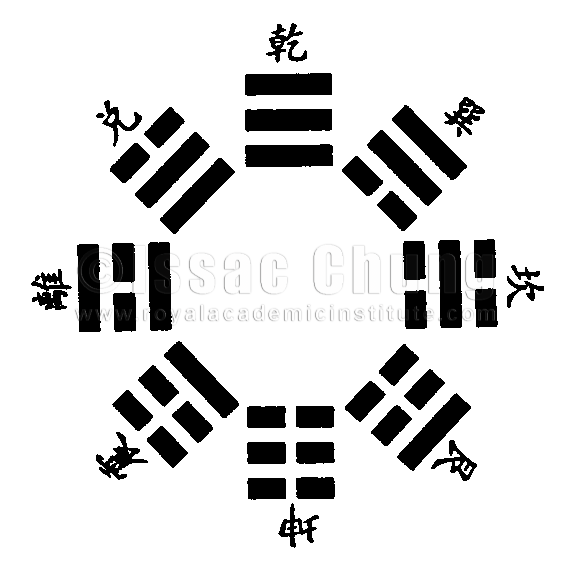
FokFei BaGua дјҸзҫІе…«еҚҰ (Inherent Hexagram е…ҲеӨ©е…«еҚҰ)
Moreover, the writer didnвҖҷt describe the idea too clearly is because he wants to keep some secrets in the book for his lineage. Nowadays we can see the diagrams in the first few pages of any I-Ching books but if you didnвҖҷt know this paragraph correlates with the above diagram, it will be quite difficult for you to interpret the whole paragraph correctly.
If you go through the translation of Mr Joseph Yu and Mr James Legge, they did not mention anything about the relationship of this paragraph and the Inherent Hexagramе…ҲеӨ©е…«еҚҰ. This is the first reason I am telling you that they didnвҖҷt know about I-Ching.
Let us analyze their interpretation by going through each sentence:
еӨ©ең°е®ҡдҪҚ
Joseph Yu (JY) translation: Heaven and Earth occupy determinate positions.
James Legge (JL) translation: (The symbols of) heaven and earth received their determinate positions;
Issac Chung (IC) translation: Sky (represented by Kinвҳ°) and earth (represented by Kwan вҳ·) fixed their position.
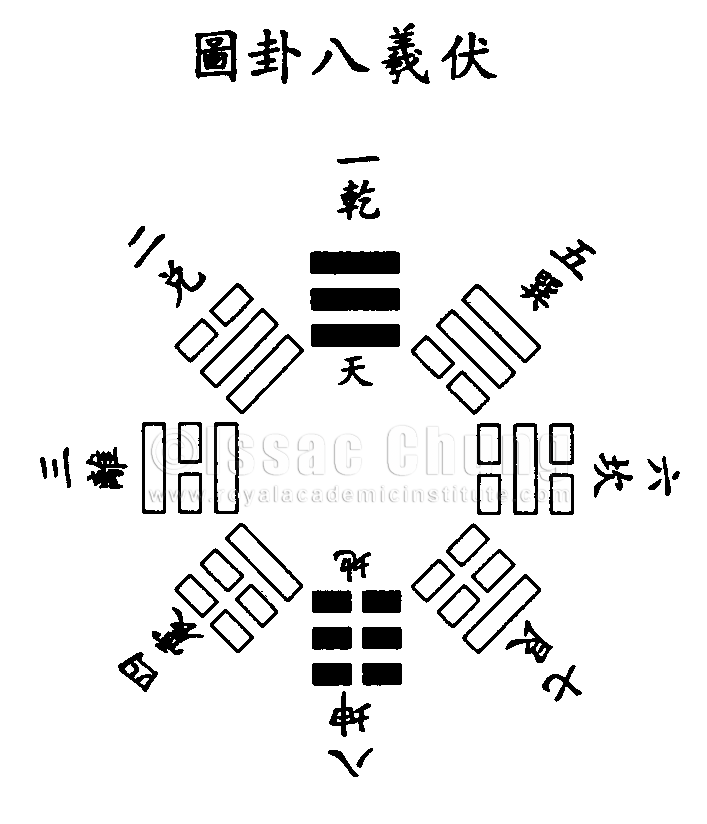
еӨ©ең°е®ҡдҪҚ
еұұжҫӨйҖҡж°Ј
JY: Mountain and Marsh communicate with their qi.
JL: (those for) mountains and collections of water interchanged their influences;
IC: Mountain (represented by Gan вҳ¶) and marsh or ocean(represented by Doi вҳұ) exchange their energies and breathings (ж°ЈHei)
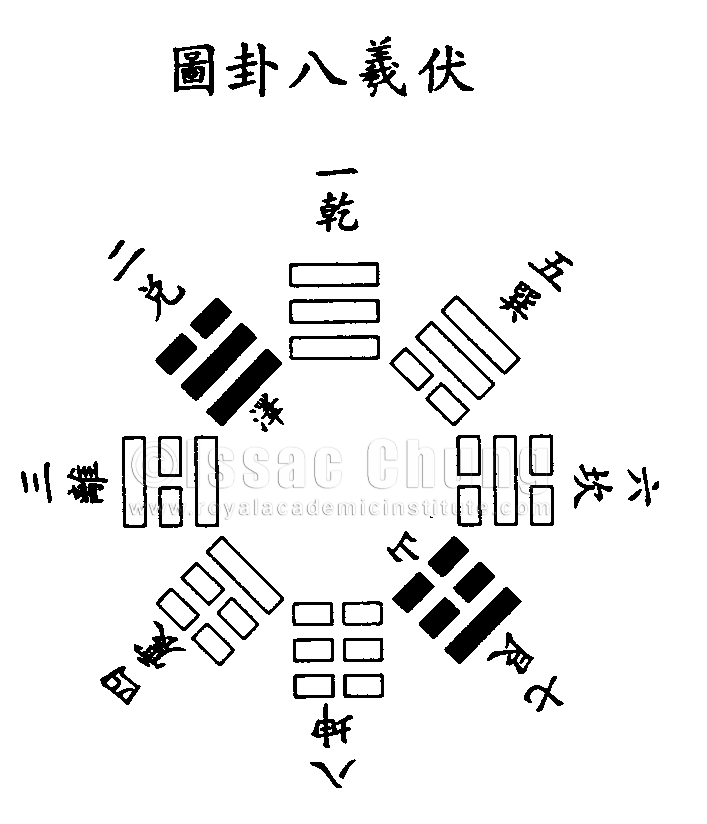
еұұжҫӨйҖҡж°Ј
йӣ·йўЁзӣёи–„
JY: Thunder and Wind excite each other.
JL: (those for) thunder and wind excited each other the more;
IC: The word Borи–„ is hard to understand and some scholars said that Borи–„ is equal to Bor жҗҸ, which means to fight and to take risk. ThatвҖҷs why both of them use excite or excited in their translation. However, Borи–„ itself has its own meaning, which you can be determined as follow:
иҝ«иҝ‘гҖҒжҺҘиҝ‘гҖӮж–ҮйҒёЛҷжқҺеҜҶЛҷйҷіжғ…иЎЁпјҡгҖҢж—Ҙи–„иҘҝеұұпјҢж°ЈжҒҜеҘ„еҘ„гҖӮгҖҚ
- Approach or getting closer, (you can compare with other classic article in the bracket.)
йҷ„и‘—гҖӮжҘҡиҫӯЛҷеұҲеҺҹЛҷд№қз« Лҷж¶үжұҹпјҡгҖҢи…ҘиҮҠдёҰеҫЎпјҢиҠідёҚи–„е…®гҖӮгҖҚ
- Attach, (you can compare with other classic article in the bracket.)
дҫөе…ҘгҖӮиҚҖеӯҗЛҷеӨ©и«–пјҡгҖҢж•…ж°ҙж—ұжңӘиҮіиҖҢйЈўпјҢеҜ’жҡ‘жңӘи–„иҖҢз–ҫгҖӮгҖҚ
- Invasion or penetration (you can compare with other classic article in the bracket.)
Thunder (represented by Jun вҳі) and wind (represented by Seon вҳҙ) are approaching each others and both have attached and penetrated each other.
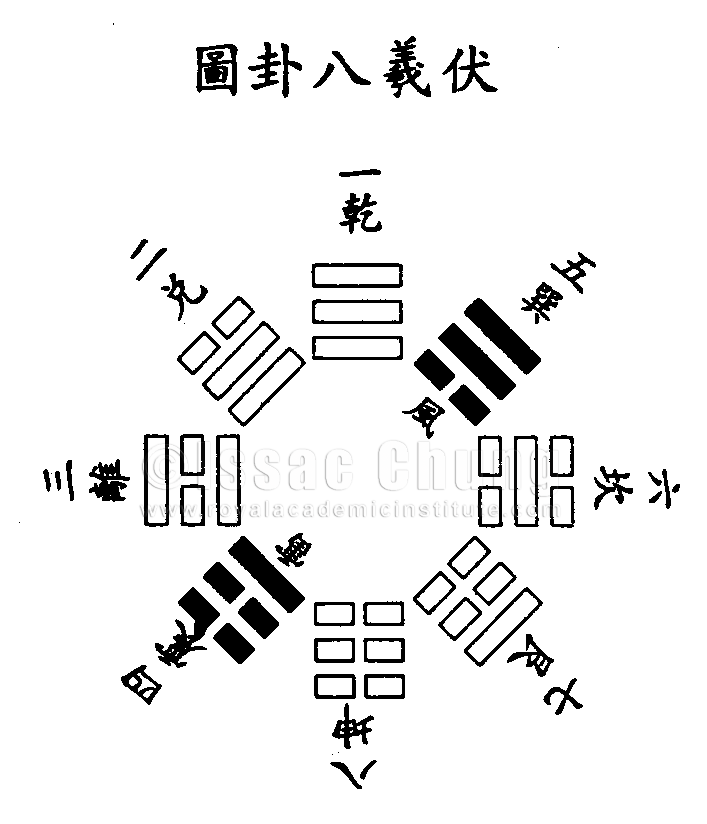
йӣ·йўЁзӣёи–„
ж°ҙзҒ«дёҚзӣёе°„
JY: Water and Fire interact but do not shoot at each other.
JL: and (those for) water and fire did each other no harm.
IC: Water(represented by Hum вҳө) also known as moon, Fire(represented by Lei вҳІ) also known as Sun in the I-Ching, Moon only reflects SunвҖҷs light, and both of their lights do not shoot at each others.
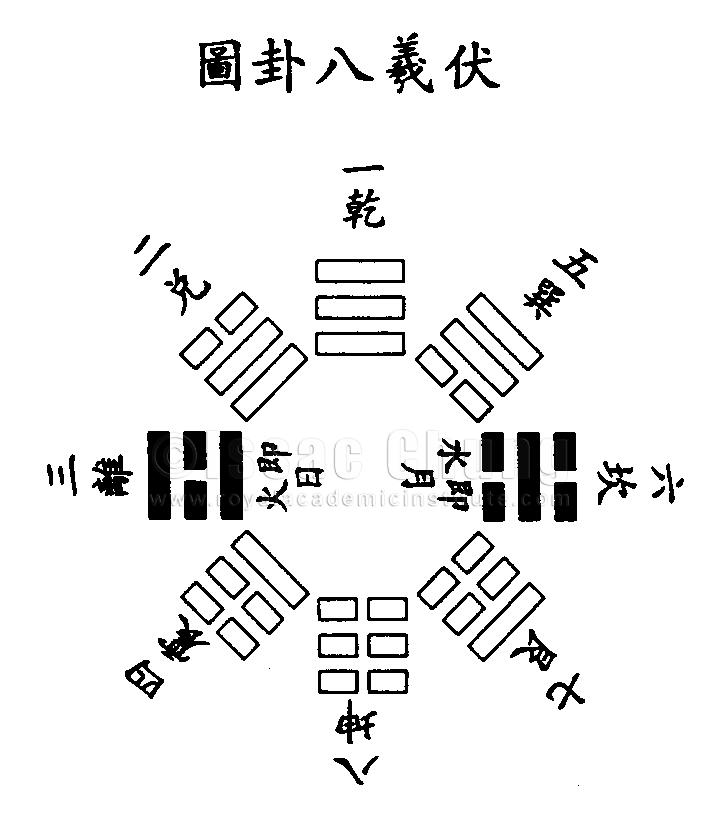
ж°ҙзҒ«дёҚзӣёе°„
е…«еҚҰзӣёйҢҜ
JY: Among the eight trigrams, there is mutual correlation.
JL: (Then) among these eight symbols there was a mutual communication.
IC: (Take a look at the Inherent Hexagramе…ҲеӨ©е…«еҚҰ) Eight trigrams are opposite to each other, their bars (зҲ» Ngaau) are mutually opposite to each other, that is positive to negative, negative to positive.

FokFei BaGua дјҸзҫІе…«еҚҰ (Inherent Hexagram е…ҲеӨ©е…«еҚҰ)
ж•ёеҫҖиҖ…й Ҷ
JY: Recollection of the past is natural.
JL: The numbering of the past is a natural process.
IC: The numbers already passed is вҖңShunй ҶвҖқ .
зҹҘдҫҶиҖ…йҖҶпјҢ
JY: Anticipation of the future may be artificial*.
JL: the knowledge of the coming is anticipation.
IC: To know the future is вҖңYikйҖҶвҖқ
жҳҜж•…гҖҠжҳ“гҖӢйҖҶж•ёд№ҹгҖӮ
JY: Therefore, Yi is against the idea of pre-determined fate.
JL: Therefore in the Yi we have (both) anticipation (and the natural process).
IC: Therefore вҖңIжҳ“вҖқ is same as YikйҖҶ which is used to know the future.
From the above comparisons, you can the differences in our perspective. Since both of them did not know this chapter is explaining the Inherent Hexagram plus they were copying from others, they have misinterpreted the meaning.
Moreover, Mr Joseph Yu only thought the general meaning of вҖңYikйҖҶвҖқ is against, and did not realize the original sentence has already clearly explained the meaning of вҖңYikйҖҶвҖқ is вҖңto know the futureзҹҘдҫҶиҖ…вҖқ. His careless or misunderstanding led him to conclude вҖңYi is against the idea of pre-determined fateвҖқ.
вҖңIжҳ“вҖқ is the mother of Chinese metaphysic, if he has misinterpreted I-Ching, I question his understanding in Chinese Classics and whether he makes the same mistakes in other metaphysicвҖҷs subjects. When his students follow his misinterpretation and start teaching others, how many beginners would be poisoned by his misconception?
To understand the problem with Mr Joseph Yu interpretation, you can view my other article at:
http://www.royalacademicinstitute.com ... s/article.php?storyid=267
http://www.royalacademicinstitute.com ... s/article.php?storyid=269
If you like to continue read my articles, please subscribe
If you like my article, please donвҖҷt hesitate to share with your friend by sending them a link or put my link in your website.
If you like to help me to translate my articles into other language, please donвҖҷt hesitate to contact me.
еӨ©ең°е®ҡдҪҚпјҢеұұжҫӨйҖҡж°ЈпјҢйӣ·йўЁзӣёи–„пјҢж°ҙзҒ«дёҚзӣёе°„пјҢе…«еҚҰзӣёйҢҜгҖӮж•ёеҫҖиҖ…й ҶпјҢзҹҘдҫҶиҖ…йҖҶпјҢжҳҜж•…гҖҠжҳ“гҖӢйҖҶж•ёд№ҹгҖӮ
The about is the original paragraph of Chapter 3 in SyutGuaJunиӘӘеҚҰеӮі.
When we translate it, we need to understand what did the original writer is talking about; otherwise we will make a fundamental mistake in the translation.
The original writer explains how did the FokFei BaGua дјҸзҫІе…«еҚҰ (Inherent Hexagram е…ҲеӨ©е…«еҚҰ) form. In the ancient time, the Chinese threaded bamboo or wooden pieces together to form a book, thus it was not convenient to draw any diagrams on it. Base on the description, the readers then could draw the diagram on a cloth or on the sands.

FokFei BaGua дјҸзҫІе…«еҚҰ (Inherent Hexagram е…ҲеӨ©е…«еҚҰ)
Moreover, the writer didnвҖҷt describe the idea too clearly is because he wants to keep some secrets in the book for his lineage. Nowadays we can see the diagrams in the first few pages of any I-Ching books but if you didnвҖҷt know this paragraph correlates with the above diagram, it will be quite difficult for you to interpret the whole paragraph correctly.
If you go through the translation of Mr Joseph Yu and Mr James Legge, they did not mention anything about the relationship of this paragraph and the Inherent Hexagramе…ҲеӨ©е…«еҚҰ. This is the first reason I am telling you that they didnвҖҷt know about I-Ching.
Let us analyze their interpretation by going through each sentence:
еӨ©ең°е®ҡдҪҚ
Joseph Yu (JY) translation: Heaven and Earth occupy determinate positions.
James Legge (JL) translation: (The symbols of) heaven and earth received their determinate positions;
Issac Chung (IC) translation: Sky (represented by Kinвҳ°) and earth (represented by Kwan вҳ·) fixed their position.

еӨ©ең°е®ҡдҪҚ
еұұжҫӨйҖҡж°Ј
JY: Mountain and Marsh communicate with their qi.
JL: (those for) mountains and collections of water interchanged their influences;
IC: Mountain (represented by Gan вҳ¶) and marsh or ocean(represented by Doi вҳұ) exchange their energies and breathings (ж°ЈHei)

еұұжҫӨйҖҡж°Ј
йӣ·йўЁзӣёи–„
JY: Thunder and Wind excite each other.
JL: (those for) thunder and wind excited each other the more;
IC: The word Borи–„ is hard to understand and some scholars said that Borи–„ is equal to Bor жҗҸ, which means to fight and to take risk. ThatвҖҷs why both of them use excite or excited in their translation. However, Borи–„ itself has its own meaning, which you can be determined as follow:
иҝ«иҝ‘гҖҒжҺҘиҝ‘гҖӮж–ҮйҒёЛҷжқҺеҜҶЛҷйҷіжғ…иЎЁпјҡгҖҢж—Ҙи–„иҘҝеұұпјҢж°ЈжҒҜеҘ„еҘ„гҖӮгҖҚ
- Approach or getting closer, (you can compare with other classic article in the bracket.)
йҷ„и‘—гҖӮжҘҡиҫӯЛҷеұҲеҺҹЛҷд№қз« Лҷж¶үжұҹпјҡгҖҢи…ҘиҮҠдёҰеҫЎпјҢиҠідёҚи–„е…®гҖӮгҖҚ
- Attach, (you can compare with other classic article in the bracket.)
дҫөе…ҘгҖӮиҚҖеӯҗЛҷеӨ©и«–пјҡгҖҢж•…ж°ҙж—ұжңӘиҮіиҖҢйЈўпјҢеҜ’жҡ‘жңӘи–„иҖҢз–ҫгҖӮгҖҚ
- Invasion or penetration (you can compare with other classic article in the bracket.)
Thunder (represented by Jun вҳі) and wind (represented by Seon вҳҙ) are approaching each others and both have attached and penetrated each other.

йӣ·йўЁзӣёи–„
ж°ҙзҒ«дёҚзӣёе°„
JY: Water and Fire interact but do not shoot at each other.
JL: and (those for) water and fire did each other no harm.
IC: Water(represented by Hum вҳө) also known as moon, Fire(represented by Lei вҳІ) also known as Sun in the I-Ching, Moon only reflects SunвҖҷs light, and both of their lights do not shoot at each others.

ж°ҙзҒ«дёҚзӣёе°„
е…«еҚҰзӣёйҢҜ
JY: Among the eight trigrams, there is mutual correlation.
JL: (Then) among these eight symbols there was a mutual communication.
IC: (Take a look at the Inherent Hexagramе…ҲеӨ©е…«еҚҰ) Eight trigrams are opposite to each other, their bars (зҲ» Ngaau) are mutually opposite to each other, that is positive to negative, negative to positive.

FokFei BaGua дјҸзҫІе…«еҚҰ (Inherent Hexagram е…ҲеӨ©е…«еҚҰ)
ж•ёеҫҖиҖ…й Ҷ
JY: Recollection of the past is natural.
JL: The numbering of the past is a natural process.
IC: The numbers already passed is вҖңShunй ҶвҖқ .
зҹҘдҫҶиҖ…йҖҶпјҢ
JY: Anticipation of the future may be artificial*.
JL: the knowledge of the coming is anticipation.
IC: To know the future is вҖңYikйҖҶвҖқ
жҳҜж•…гҖҠжҳ“гҖӢйҖҶж•ёд№ҹгҖӮ
JY: Therefore, Yi is against the idea of pre-determined fate.
JL: Therefore in the Yi we have (both) anticipation (and the natural process).
IC: Therefore вҖңIжҳ“вҖқ is same as YikйҖҶ which is used to know the future.
From the above comparisons, you can the differences in our perspective. Since both of them did not know this chapter is explaining the Inherent Hexagram plus they were copying from others, they have misinterpreted the meaning.
Moreover, Mr Joseph Yu only thought the general meaning of вҖңYikйҖҶвҖқ is against, and did not realize the original sentence has already clearly explained the meaning of вҖңYikйҖҶвҖқ is вҖңto know the futureзҹҘдҫҶиҖ…вҖқ. His careless or misunderstanding led him to conclude вҖңYi is against the idea of pre-determined fateвҖқ.
вҖңIжҳ“вҖқ is the mother of Chinese metaphysic, if he has misinterpreted I-Ching, I question his understanding in Chinese Classics and whether he makes the same mistakes in other metaphysicвҖҷs subjects. When his students follow his misinterpretation and start teaching others, how many beginners would be poisoned by his misconception?
To understand the problem with Mr Joseph Yu interpretation, you can view my other article at:
http://www.royalacademicinstitute.com ... s/article.php?storyid=267
http://www.royalacademicinstitute.com ... s/article.php?storyid=269
If you like to continue read my articles, please subscribe
If you like my article, please donвҖҷt hesitate to share with your friend by sending them a link or put my link in your website.
http://www.royalacademicinstitute.com/modules/news/index.php?storytopic=21
If you like to help me to translate my articles into other language, please donвҖҷt hesitate to contact me.
Rating: 0.00 (0 votes) - Rate this News -
The comments are owned by the author. We aren't responsible for their content.
Master Chung's Articles
|

